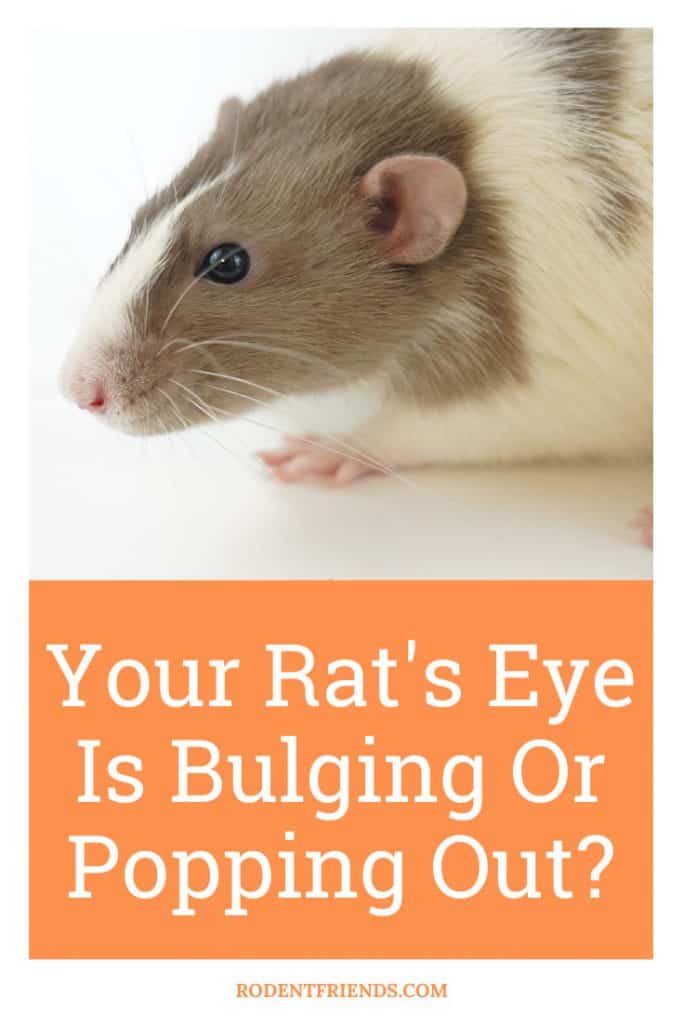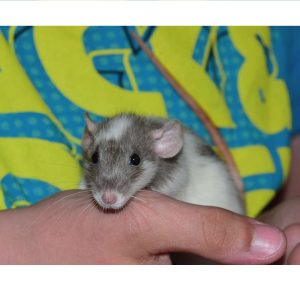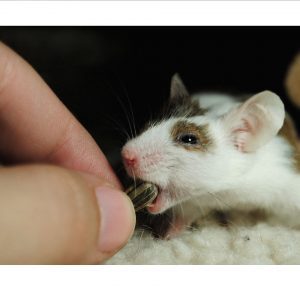Rats’ eyes are very sensitive and usually one of the first signs of infection in the body. Any anomaly or unusual feature in their eyes could be a symptom of illness, so it’s important to keep an eye on them.
It is necessary to know about normal and abnormal features and symptoms of diseases and infections. As a result, before adopting a pet, be sure to extensively observe the pet rat’s behavior and health risks.
A tumor or abscess behind the eye is the most prevalent cause of bulging eyes in rats. More than that, conjunctivitis, corneal ulcer, keratoconjunctivitis, entropion, and respiratory infections are only a few of the various reasons for red secretions in the eyes.
Consult a veterinarian as soon as you notice your rat’s eyes bulging and popping out. He or she will assess the signs and symptoms and make a pharmaceutical recommendation.
Tumor Under the Eye or Abscess in The Top Jaw
Rats may have a tumor behind the eye, in the eye socket. Blood vessels run through the eye socket, and a tumor can form in these blood vessels, causing bulging eyes. The tumor may begin with an accumulation of abscesses on the top jaw in some situations.
Tumors can also cause an abscess behind the eyes. Pain, itching, swelling, and the ejection of sticky and mucous-like fluid from the eyes are all signs and symptoms.
So, if you notice these signs in your pet, take him or her to the vet right away because some tumors, such as malignant tumors, might spread and cause death. Pet rats are very fragile and it’s always good to catch any disease as soon as possible, to ensure a quick recovery!
Signs of Corneal Ulcers
Corneal ulcers are caused by pinching hairs that irritate the cornea. Scratching and damage from sharp grass or hay, which can pierce the cornea and cause ulcers, may also be to blame. The cornea becomes thick and cloudy as a result of this.
A corneal ulcer can easily be treated if you notice the signs and consult a vet to start treatment. Pain, watery eyes, a cloudy appearance, redness, and discharge from the eyes are all frequent indications and symptoms. However, if left untreated, ulcers can cause irreversible damage, corneal over-thickening, and vision loss, making treatment difficult.
To avoid this from happening, it’s good to get safe and comfortable bedding. Straw-like bedding might be quite popular, but as you can see it can accidentally hurt your pet rats.
I always like to recommend the Carefresh Paper Bedding. Its composition ensures an odor-free cage for longer, but also a dust-free space for your pet rats!
Signs of Eye Infections
Rats’ eyes are sensitive to bacterial and fungal eye infections. Infections in the cage are caused by unsanitary surroundings and poor ventilation. When streptococcal bacteria enter the eyes, the moisture helps them grow, producing an infection.
The infection leads to inflammation of the conjunctiva known as conjunctivitis. Swelling, wet eyes, soreness, redness, blurred vision, discharge, and inflammation of the eyelids are some of the other symptoms. It is critical to treat the infection as soon as possible; otherwise, it might result in irreversible visual loss and, in some cases, impact the nerve system. So, don’t use non-prescribed medications and consult a vet.
How To Treat Rat Eye Bulging or Popping out?
Bulging eyes are caused by malignancies in the eye socket, as previously stated. Both benign and malignant tumors are hazardous and lethal, but malignant tumors are more dangerous because they can spread through vessels from one place to another.
This tumor can be surgically removed by a veterinarian. Your local vet will conduct tests to determine whether the tumor is benign or cancerous, and then prescribe medicine according to the results.
Unfortunately, because aberrant cell division occurs in that location, malignant tumors can reappear after surgery.

Antibiotic Eye Drops or Oral Antibiotic Administration
To treat bacterial infections, antibiotic eye drops are always prescribed. Bacteria can be killed and prevented with eye drops.
Bacteria can cause dry eyes, and these drops help to hydrate the eyes so that they can rotate easily in the eye socket. Rats with eye tumors are given oral antibiotics after surgery to prevent the proliferation of bacteria in the eyes.
Because respiratory infections can produce redness and watery eyes, it’s a good idea to provide oral antibiotics in these cases.
Surgery Rat Eye
There are many eye problems that require surgery such as eye tumor, entropion, ectropion, and cataract. These diseases primarily affect rats in their elderly years.
The cost of eye surgery, particularly tumor surgery, is exceedingly high. If you take proper care of your pet, it should be able to recover in 10 to 15 days.
It takes time to recover from tumors and surgery because it is challenging for pet owners to take good care after eye surgery. Rats scratch and rub their eyes, causing injury and corneal ulcers.
They are also very small and fearful animals and will avoid being touched when hurting. Even if it’s for their own good
To avoid further difficulties that could lead to surgical failure, it’s very important to keep the rat under your supervision.
How To Prevent Rat Eye Problems?
Because prevention is preferable to cure, you should take precautions to avoid eye disorders. A dirty cage, respiratory difficulties, poor cage ventilation, fighting with cage mates, and allergies are all typical causes of eye disorders.
To avoid eye problems, keep the cage clean and ventilated. Bacteria might proliferate owing to dampness in the cage if the ventilation system is inadequate. These bacteria cause infection when they invade the eyes.
It’s also critical to keep the cage clean and fungus-free, as this might lead to fungal infection.
Fighting with other rats can result in eye problems such as corneal ulcers. They can scrape and tear the cornea while fighting, which can lead to a corneal ulcer if left untreated.
To avoid eye damage, all rats’ nails should be trimmed. If you notice any damage or scratch on their eyes, see a veterinarian right away since germs can multiply and cause illness.
Why is my rat shaking?
Rats shake for a variety of reasons and depending on the situation, this might be normal or pathological. Shaking is natural and expected behavior in rats when they are excited or when they are given their favorite treats.
They also begin to shake after a certain amount of time has passed since they last saw their owner.
In the cold, shaking can indicate a drop in temperature. Shaking with a high fever, for example, can indicate a respiratory or bacterial infection. Rats shake in the wild when they see a predator, which could be a bird or a wild cat.
So, as you can see it can be both bad or good that your pet rat is shaking, so it’s good to know other signs that accompany it. This way you’ll know if your pet rat is just excited to see you or if they need any special attention!
Shaking due to cold or fever
Rats should not be kept near often opened windows or outside doors, nor should they be kept near air conditioners, heat, or air conditioning registers, or even near them.
They start shaking when their body temperature drops more than normal. The hypothalamus is affected by a high fever, causing the rat to shiver uncomfortably.
When rats are cold, they shake their entire body, excluding their extremities, however, when they have a fever, they shake their entire body, including their head and legs.
If you live in particularly cold places, it’s important to provide them with enough hiding spots and bedding, so they can sleep in comfort and warmth!
Shaking due to bruxing
When excited, rats engage in a behavior known as bruxing in which they grind their teeth and make low-pitched noises.
This can happen when the rat’s favorite snacks are brought into the room or when they see you!
Over-excitement caused by the release of hormones like dopamine and endorphins causes the rats to shake. The release of oxytocin also increases rat excitement, causing them to shake and vibrate.
When it happens, pet and show them affection, so they know the feeling is mutual!
Shaking due to respiratory Issues
Shaking can indicate that your rat is in pain or is sick. Shivering or shaking can be signs of major illnesses like respiratory issues, hypoglycemia, and inflammatory brain disease, as well as minor problems like stomach distress.
Look out for other signs such as unusual lethargy and loss of appetite. Your pet rat might also shy away from you, to hide their illness!
Shivering that doesn’t go away can be a sign of generalized trimmer syndrome, also known as shaker syndrome, a chronic illness that can be treated with medicine.
Can you use human eye drops on pet rats?
No, you need a prescription from a veterinarian to use the eye drops on pets. Because the dosage for humans and pet rats is different, pets could react negatively and become poisoned if human eye drops are used on them.
Therefore, it is essential to only use medications that a veterinarian has prescribed.
Before giving any treatment to your pet rat, it’s important to first contact your vet. Pet rats are very sensitive, so proper medication, given by a professional is a must.
Final Words
Rats are prone to eye issues such as tumors, eye infections, and redness. Because eyes are sensitive, any issue can result in vision loss.
You should consult a veterinarian if you observe any signs of eye disease. Infection, trauma, and ulcer can all result from a minor scratch in the eye.
As a result, owners should take preventative measures to avoid such issues.
The most important thing to do to prevent eye problems in a pet is to keep his or her environment nice and clean.
Proper bedding and accessories are important to keep your pet rats healthy. Not only that, but it’s good to make daily cleaning of the cage, so it remains odor-free for longer and to avoid bacteria.
Your pet rats will also feel happier in a clean and orderly cage!





